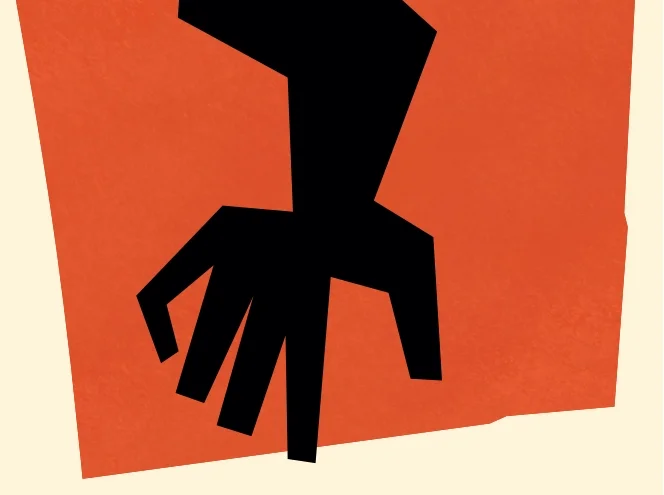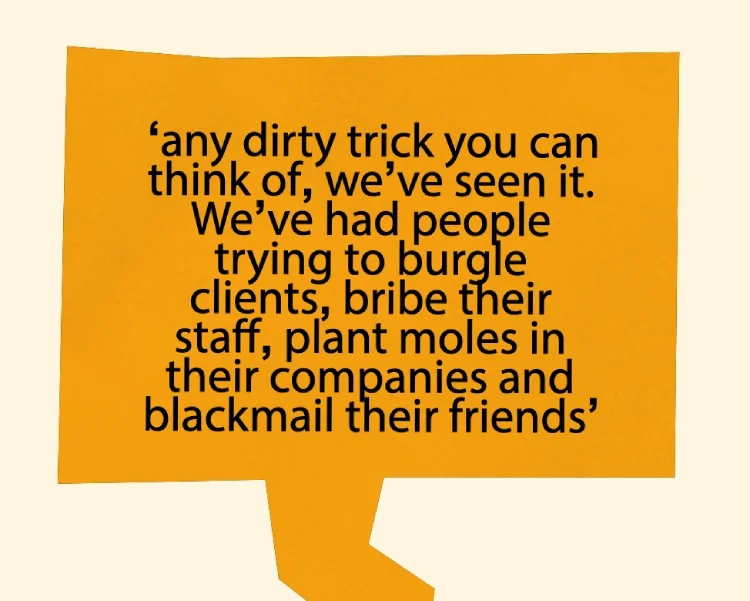
Once upon a time, a divorcing multi-millionaire minded to hide his wealth might have slipped funds quietly into the bank account of an obliging relative or created a Panama front company in order to buy his own superyacht. Today the same kind of evasion might involve a simpler yet potentially more elusive asset, one that doesn’t require a crew or gallons of fuel: cryptocurrencies.
Private investigators are racing to become specialists in tracing crypto assets, often for law firms acting in divorce cases. Marlon Pinto, director of investigations at Another Day, a boutique London investigations firm, says enquiries started in May 2020. ‘Nobody was really jumping on it back then,’ he says.
[See also: How to prepare for mediation]
Until 2018, Pinto had pursued more tangible assets as a detective in the Metropolitan Police’s Flying Squad. His cases included the notorious Hatton Garden safe heist of 2015.
Now requests for crypto investigations reach his desk almost weekly. The work is complex but typically involves using forensic software to find links between anonymised crypto wallets and real-world entities such as bank accounts and IP addresses.
Pinto and his growing team package the results for clients and the courts. ‘A couple of weeks ago I gave a talk at the Family Court in London and there were nearly 50 judges trying to understand how we do this, because there’s such massive growth,’ he says.

The boom in corporate investigations
The sudden need for such work is just one way the landscape is shifting for a rapidly evolving industry that is often maligned yet in greater demand than ever. Investigators report that HNWs and family offices are reaching for their phone numbers as readily as those of Michelin-starred restaurants and private jet brokers.
‘A lot of the big players are heavy on due diligence for corporates,’ says Lily Kennett, who runs the intelligence and investigations department at law firm Schillings. ‘But I think there’s a real need for investigative work for individuals, which has been a real growth area.’
Kennett, who works alongside fellow partner and investigator Juliet Young, says ever growing public interest in the lifestyles and dealings of the ultra-rich is also driving demand. Their work tends to fall into three often overlapping categories, all of which tend also to blur the lines between a client’s personal and business interests, as well as an instinct to save face as much as money.
‘Bad insider’ cases involve staff, family or friends. Disputes might include divorces, succession battles or contract crises. Then there are commercial cases. A recent report by Swiss bank UBS revealed how family offices are increasingly investing in private equity. Such exposure carries higher risk, which is leading to more calls for investigators to find potential red flags.
[See also: What happens when a party in a divorce tries to conceal assets in England and Wales]
Investigators say wealthy clients are generally more diligent and cautious than ever. Many have also lost faith in resource-strapped police forces. Another Day is increasingly asked to investigate crimes such as burglaries.
‘We’ll do the CCTV enquiries, take witness statements, start looking at vehicles that might be involved and package it all up to get the police to respond,’ Pinto says.
Meanwhile, the pandemic prompted many families to dust off grown-up admin such as succession planning. ‘And the flipside of succession planning is family disputes,’ says Kate Bright, a security specialist who has worked with dozens of families and is the founder and CEO of Umbra International Group.
Big firms, which increasingly compete with boutiques, include Kroll, K2 Integrity, FTI Consulting, Control Risks and Mintz Group. Everyone is tight-lipped about fees, but single projects tend to start at £25,000 at the top end of the market, while retainers of at least £50,000 a month are not uncommon for clients who want someone on-call round the clock.
A highly profitable model for corporate intelligence
All the while, a business model that dates back almost two centuries is continuing to evolve as new technology and data sources bring it out of the shadows.
Private eyes first opened for business in the UK in the 1850s, when changes in matrimonial law meant adultery ceased to be a crime but still needed to be proved. Charles Frederick Field, a former police detective, was London’s first private investigator (a friend of Dickens, he was the inspiration for Inspector Bucket in Bleak House). Gathering evidence of adultery from indiscreet valets was an unseemly business in big demand.
In the same decade in the US, only a few years after Edgar Allan Poe had introduced the fictional Parisian gentleman spy Auguste Dupin, an Illinois barrel maker called Allan Pinkerton established his own detective agency with the motto ‘We never sleep’. It grew into a vast network of private ‘dicks’ who investigated the likes of train robberies and counterfeiters.
The modern investigator is more likely to trace their roots to Jules Kroll, who founded what became Kroll in 1972. The industry giant set a new standard for a professionalised, corporate approach to what had been the preserve of the ‘gumshoes’ who still define the popular image of the private detective. Kroll wore the same expensive suits as his clients and responded to growing demand for more prosaic corporate legwork, typically in the financial sector: due diligence, corporate compliance, background checks.
As the corporate world became ever more complex with the rise of new technologies and globalisation, the risks associated with doing business multiplied. Kroll filled that gap, creating a widely copied and highly profitable model for corporate intelligence.
Kroll, which today has more than 5,000 people working in 140 countries, also spawned countless rivals and offshoots, including K2 Integrity, which Kroll founded with his son Jeremy in 2009 after leaving his own firm. Patrick Grayson, a debonair former Irish Guardsman, launched the London outpost of Kroll in 1986.
After the first Gulf War, he tracked Saddam Hussein’s hidden billions. In 2004 he founded GPW, a firm that typified the Mayfair boutiques that bobbed in Kroll’s wake to bring a more personal touch for London’s increasingly wealthy elite.
‘The perception of a corporate investigator went from a spook under a lamppost to a chap who looked like a lawyer or a banker – and may indeed have been one,’ Grayson told me a few years ago. ‘Now you’ve got a busy marketplace, from big corporate security companies down to one-man ex-MI6 types helping large companies either stay out of trouble or get out of trouble.’
As the industry grew, it created profitable second careers for a generation of former spies – perhaps most notably Christopher Steele, who worked for MI6 before co-founding Orbis Business Intelligence in London in 2009. He later found infamy when he was exposed as the author of the dossier on links between the Russian government and Donald Trump’s 2016 campaign.

Blurred lines
Like former police detectives and prosecutors, ex-spies had to work around severely reduced investigative powers. ‘We cannot flip witnesses, blackmail agents, develop confidential informants, bug phones, offer protection, send subpoenas, or bribe sources,’ writes Tyler Maroney, a Kroll alumnus and co-founder of American investigations firm QRI, in his 2020 book The Modern Detective.
But lines have often been blurred. In 1995, a group of British former spies founded Hakluyt in Mayfair and the company once cultivated an air of secrecy. The Sunday Times reported that in 2001 it had used a German investigator to spy on Greenpeace for oil companies – tactics that the firm’s current leadership told the FT last year would be beyond the pale as it sought to demystify its work.
[See also: Why HNWs are at risk from abuse of Interpol Red Notices]
Black Cube became synonymous with ex-spy overreach when the Israeli firm, also founded by ex-intelligence officers, played a key role in the aggressive pursuit of victims and journalists involved in holding disgraced Hollywood producer Harvey Weinstein to account. Everyone I speak to has had their own encounters with bad practice. A licence is required to operate in the US, but efforts to regulate the UK industry have fallen flat.
‘Literally any dirty trick you can think of, we’ve probably seen it,’ says Kennett at Schillings. ‘We’ve had people trying to burgle clients, bribe their staff, plant moles in their companies and blackmail their friends. We’ve seen fake data breach websites that put stolen documents in the public domain… and sometimes you would be surprised at the brand name recognition of some of the people who are doing this. For some sections of the industry, there’s still a bit of a “by any means necessary” culture.’
Maroney, who started out as an investigative journalist, tells me the industry is far more diverse than it was when ex-spies, cops and soldiers dominated. QRI employs investigators with backgrounds in academia, journalism, computer science, trade unionism and government prosecution.
Beyond basic ethics and an aversion to prison, he says the investigators who ply their trade at reputable firms are driven by a simple imperative: their evidence should be admissible in court. Even entry-level subterfuge is frowned upon; Maroney only ever introduces himself as a private detective.
‘People believe that we are living in Minority Report‘
Stories of bad practice combine with Hollywood ideals to warp clients’ expectations of what can legally be done. Robert Capper, a British former government intelligence officer who now runs a global asset-tracing and complex investigations practice at Ankura, a business advisory firm, tells me he was stunned last year by a request from an inhouse counsel.
‘It was, “Could you get us footage from the arrivals hall in Munich Airport from 2006?”, and I was just sort of sitting there thinking, “What planet are you living on?”’ Capper says. ‘People genuinely believe that we are living in Minority Report.’
Capper remains professional in the face of such requests, typically suggesting less sexy but more legitimate techniques. ‘Actually unpacking their problem and understanding where they want to get to is normally a large part of the challenge,’ he explains. ‘The other part is assuring them that we can probably get them there, but in a very different way.’
The art of talking
New avenues open almost weekly as governments digitise and expand registries. Third-party datasets fill in gaps in what is available. ‘So anyone can use the UK land registry to find out who owns a property, but I can’t see what other properties a person owns – except I can, because somebody else has filled a boiler room full of postgraduate students in Oxford and rebuilt the database so you can search it that way for £200 a year,’ Capper says.
Investigators also leap on data leaks, buying up directories, registries and document dumps on the dark web in case they become useful in a future case. ‘You can get as much value from the Estonian corporate registry as you can Instagram or an old tax filing that’s leaked its way on to the internet,’ Capper says. ‘We find all sorts – old company invoices, customs paperwork or details of what’s on container ships.’
So, rather than illegally hack an airport’s camera systems or bribe a security guard to find out if a target passed through the arrivals hall in Munich, Capper might look for private jet manifests or refuelling receipts, social media posts, visa data or indications of the target’s movements after the flight. ‘They don’t actually need the airport footage, but that’s where their brain has taken them,’ he says.
Maroney’s favourite technique is the oldest trick in the book: speaking to people. It took months to secure an interview in a federal prison with a Connecticut financier who had been convicted of defrauding investors in a hedge fund. Maroney wanted to ask the inmate about a man who had once worked at the fund.

Maroney’s client – a wealthy individual – was poised to invest $25 million into the man’s new fashion company. Maroney had already checked criminal, debt and bankruptcy records. He had mined the target’s CV and social media, cross-checking account handles with potentially compromising activity on, for example, prostitution sites.
Nothing had come up. It was only when the jailed financier casually recalled a ‘typo’ in the target’s CV that Maroney cracked the case. The typo was in fact a slip: this was the man’s real name. New searches revealed that he had been fined and suspended by the US Securities and Exchange Commission in what amounted to a case of theft. Maroney’s client decided not to invest.
‘Stupidity is still our biggest asset’
Mistakes drive the investigations business. ‘Stupidity is still our biggest asset,’ Capper explains. One man he was looking into had gone to great lengths to hide his identity and property assets – except when he had used his own name to write a letter to an architect that ended up being part of a publicly available planning application.
In a previous role, Capper and his then colleague Daniel Hall were tasked with finding Michael Mastro, a failed property mogul who had fled the US with his wife while owing hundreds of millions of dollars to investors. The FBI, among other agencies, had failed to find Mastro or his money, knowing only that he had flown to Portugal, where he had also shipped a Range Rover.
[See also: Why HNWIs’ bank accounts are being closed ‘without explanation’]
Capper and Hall soon got a scent. Mastro’s wife registered the car in France, where the search later focused on the Alpine city of Annecy. It was only when the investigators put themselves in Mastro’s well-heeled shoes that they made a breakthrough. The American couple’s prized shihtzus were also missing.
‘Find the dogs,’ they concluded, ‘and you find the man.’
Capper knew the dogs were old, indulged and probably unhealthy. So he searched for vets in Annecy and visited the poshest looking one with a photo of Mastro and an upfront plea: help us find a fugitive. The ruse worked, eventually leading Capper to Mastro’s front door, where – ironically – he had stencilled his name on his mailbox.
Managing instincts and motivations
Whether a job is a whodunnit, a manhunt or a search for crypto assets, the challenge of managing instincts and motivations starts with the client. Pinto is working for a UHNW client who has lost money in a bitter family dispute.
‘He wants to take this family member to the cleaners, really take them down,’ he says. ‘And we always have to say at the beginning of cases that we are going to be in control of an investigation because if it’s dictated by the client’s emotions, it can go off track very quickly.’
Investigators live for breakthroughs. ‘It’s moments like asking a guy who has argued black and blue in court that a private jet is not his and then saying, “Well, how come the fuel for the past three years has gone on your personal Amex?”’ Capper says.
Back at Another Day, Pinto says that while it’s hard to recreate the exhilaration of some of his Flying Squad cases, ‘the satisfaction is the same… When you find a crypto wallet that nobody knew about and that the target thought they’d hidden so well, watching them get flustered when you question them about it feels really good.






